- Home
- Aaron Allston
Mercy Kill
Mercy Kill Read online
Star Wars: X-Wing: Mercy Kill is a work of fiction. Names, places, and incidents either are products of the author’s imagination or are used fictitiously.
Copyright © 2012 by Lucasfilm Ltd. & ® or ™ where indicated.
All Rights Reserved. Used Under Authorization.
Excerpt from Star Wars: Scoundrels copyright © 2012
by Lucasfilm Ltd. & ® or ™ where indicated.
All Rights Reserved. Used Under Authorization.
Published in the United States by Del Rey, an imprint of The Random House Publishing Group, a division of Random House, Inc., New York.
DEL REY is a registered trademark and the Del Rey colophon is a trademark of Random House, Inc.
This book contains an excerpt from Star Wars: Scoundrels by Timothy Zahn.
This excerpt has been set for this edition only and may not reflect the final content of the forthcoming edition.
eISBN: 978-0-345-53480-4
www.starwars.com
www.delreybooks.com
Facebook.com/starwarsbooks
Cover art: Mike Bryan
Cover design: Scott Biel
v3.1_r3
Longtime readers of the X-Wing series have persisted for years in asking me, Del Rey, Lucasfilm, and possibly passing strangers, “When will there be another X-Wing novel?”
The answer is “now,” and I suspect that a lot of the credit for Mercy Kill goes to your dogged and tireless insistence that this project should happen.
Thanks, guys.
ACKNOWLEDGMENTS
Thanks go to:
My editor, Shelly Shapiro; Jennifer Heddle and Leland Chee of Lucas Licensing;
My agent, Russell Galen;
My eagle-eyes, Kelly Frieders, Roxanne Quinlan, Luray Richmond, Janine K. Spendlove, and Sean Summers; and Michael A. Stackpole, for setting the X-Wing novel series in motion all those years ago.
Contents
Cover
Title Page
Copyright
Acknowledgments
Dramatis Personae
Chapter One
Chapter Two
Chapter Three
Chapter Four
Chapter Five
Chapter Six
Chapter Seven
Chapter Eight
Chapter Nine
Chapter Ten
Chapter Eleven
Chapter Twelve
Chapter Thirteen
Chapter Fourteen
Chapter Fifteen
Chapter Sixteen
Chapter Seventeen
Chapter Eighteen
Chapter Nineteen
Chapter Twenty
Chapter Twenty-one
Chapter Twenty-two
Chapter Twenty-three
Chapter Twenty-four
Chapter Twenty-five
Chapter Twenty-six
Chapter Twenty-seven
Chapter Twenty-eight
Chapter Twenty-nine
Chapter Thirty
Chapter Thirty-one
Chapter Thirty-two
Chapter Thirty-three
Chapter Thirty-four
Chapter Thirty-five
Chapter Thirty-six
Chapter Thirty-seven
Chapter Thirty-eight
Other Books by This Author
About the Author
Excerpt from Star Wars: Crucible
Introduction to the Star Wars Expanded Universe
Excerpt from Star Wars: X-Wing: Rogue Squadron
Introduction to the Old Republic Era
Excerpt from Star Wars: Knight Errant
Introduction to the Rise of the Empire Era
Excerpt from Star Wars: Republic Commando: Hard Contact
Introduction to the Rebellion Era
Excerpt from Star Wars: Shadows of the Empire
Introduction to the New Republic Era
Excerpt from Star Wars: Ambush at Corellia
Introduction to the New Jedi Order Era
Excerpt from Star Wars: New Jedi Order: Vector Prime
Introduction to the Legacy Era
Excerpt from Star Wars: Millennium Falcon
Excerpt from Star Wars: Fate of the Jedi: Outcast
Star Wars Legends Novels Timeline
DRAMATIS PERSONAE
Bhindi Drayson; retired intelligence officer (human female)
Garik “Face” Loran; retired intelligence officer (human male)
Jesmin Tainer; Antarian Ranger (human female)
Myri Antilles; gambler (human female)
Stavin Thaal; general (human male)
Trey Courser; mechanical engineer (human male)
Turman Durra; actor (Clawdite male)
Viull “Scut” Gorsat; biofabricator (Yuuzhan Vong male)
Voort “Piggy” saBinring; mathematics professor (Gamorrean male)
Wedge Antilles; retired pilot (human male)
A long time ago in a galaxy far, far away.…
CHAPTER ONE
RYVESTER, MERIDIAN SECTOR
13 ABY (31 Years Ago)
Imperial Admiral Kosh Teradoc paused, irritated and self-conscious, just outside the entryway into the club. His garment, a trades-being’s jumpsuit, was authentic, bought at a used-clothes stall in a poverty-stricken neighborhood. And the wig that covered his military-cut blond hair with a mop of lank, disarrayed brown hair was perfect. But his posture—he couldn’t seem to shake off his upright military bearing, no matter how hard he tried. Loosening his shoulders, slumping, slouching … nothing worked for more than a few seconds.
“You’re doing fine, Admiral.” That was one of his bodyguards, whispering. “Try … try smiling.”
Teradoc forced his mouth into a smile and held it that way. He took the final step up to the doors. They slid aside, emitting a wash of warmer air and the sounds of voices, music, and clinking glasses.
He and his guards moved into the club’s waiting area. Its dark walls were decorated with holos advertising various brands of drinks; the moving images promised romance, social success, and wealth to patrons wise enough to choose the correct beverage. And they promised these things to nonhumans as well as humans.
One of Teradoc’s guards, taller and fitter than he was and dressed like him, kept close. The other three held back as though they constituted a different party of patrons.
The seater approached. A brown Chadra-Fan woman who stood only as tall as Teradoc’s waist, she wore a gold hostess gown, floor-length but exposing quite a lot of glossy fur.
Teradoc held up three fingers. He enunciated slowly so she would understand. “Another will be coming. Another man, joining us. You understand?”
Her mouth turned up in the faintest of smiles. “I do.” Her voice was light, sweet, and perhaps just a touch mocking. “Are you the party joining Captain Hachat?”
“Um … yes.”
“He’s already here. This way, please.” She turned and led them through broad, open double doors into the main room.
Teradoc followed. He felt heat in his cheeks. The little Chadra-Fan—had she actually condescended to him? He wondered if he should arrange an appropriate punishment.
The main room was cavernous, most of its innumerable tables occupied even at this late hour. The music and the din of conversation grew louder. And the smells—less than a quarter of the patrons were human. Teradoc saw horned Devaronians, furry Bothans, diminutive Sullustans, enormous, green-skinned Gamorreans, and more, and he fancied he could smell every one of them. And their alcohol.
“You’re upright again, sir. You might try slouching.”
Teradoc growled at his guard but complied.
There was one last blast of music from the upraised stage, and then the band, most of the players nonhuman, rose to the crowd
’s applause. They retreated behind the stage curtain.
Moments later the noise of the audience, hundreds of voices, changed—lowered, became expectant in tone. A new act filed out onstage. Six Gamorrean males, dressed in nothing but loincloths, their skin oiled and gleaming, moved out and arrayed themselves in a chevron-shaped formation. Recorded dance music, heavy on drums and woodwinds, blasted out from the stage’s sound system.
The Gamorreans began moving to the music. They flexed, shimmied, strutted in unison. A shrill cry of appreciation rose from Gamorrean women in the audience, and from others as well.
Teradoc shuddered and vowed to sit with his back to the dancers.
The Chadra-Fan led him to a table only a few meters from the stage. A human man sat there already. Of medium height and muscular, he was young, with waist-length red hair in a braid. Costume jewelry, polished copper inset with black stones, was woven into the braid. He wore a long-sleeved tunic decorated with blobs of color of every hue, mismatched and discordant; it clashed with his military-style black pants and boots. He stood as Teradoc and his guard arrived.
“Captain Hachat?”
“The one and only.” Hachat sat again and indicated the guard. “Who’s your friend? He looks like a hundred kilos of preserved meat.”
The Chadra-Fan seater, satisfied that she had discharged her duty, offered a little bow. “Your server will be here in a few moments.” She turned and headed back to her station.
Teradoc glared after her and seated himself, facing away from the stage. He waited until his guard was in a chair before continuing. “Your messenger hinted at names. I want to hear them now … and to see proof.”
Hachat nodded. “Of course. But first—would it help you to stop smiling? It looks like it’s hurting your face.”
“Um … yes.” Teradoc relaxed, realized that his cheek muscles were indeed aching. He glanced around, noted the postures of many of the patrons around him, and slid down a little in his chair to match their slouches.
“Much better.” Hachat sipped his drink, a poisonous-looking yellow concoction that glowed from within. There were two glasses, mostly empty but with a similar-looking residue at the bottom, beside it. “All right. I run a private space naval operation specializing in covert operations, especially retrievals.”
Teradoc suppressed a sigh. Why can’t they ever just say, “I’m a pirate, a smuggler, a low-life piece of scum with something to sell”? Honesty would be so refreshing.
“We recently found a prize vessel … one whose value could enable us to retire in luxury.”
Teradoc shrugged. “Go on.”
“The Palace of Piethet Brighteyes.”
“I thought that was what your messenger was hinting at. But it’s preposterous. In the centuries since it disappeared, the Palace has never been sighted, never reported. It will never be found.”
Hachat grinned at him. “But it has been. Abandoned, intact, unplundered, in an area of your sector well away from settlements or trade routes.”
“If you’d found it, you’d be selling off its jewels, its furnishings, all those paintings. Through a fence. Yet you come to me. You’re lying.”
“Here’s the truth, Admiral. The vessel’s antipersonnel defenses are still active. I lost a dozen men just getting into a secondary vehicle bay, where I retrieved one artifact and some lesser gems. Oh, yes, I could fire missiles at the palace until it cracked … but I would prefer to lose half its contents to a worthwhile partner than to explosions and hard vacuum. At least I’d get a partner and some goodwill out of it.”
Teradoc rubbed at his temple. The boom-boom-boom from the sound system onstage behind him was giving him a headache. He returned his attention to Hachat. “Don’t use my rank. Don’t speak my name here.”
“Whatever you want.” Hachat took another sip of his drink. “You have access to Imperial Intelligence resources, the best slicers and intrusion experts in the galaxy. They could get past those defenses … and make us both rich.”
“You mentioned an artifact.”
“I have it with me. A show of faith, just as you proposed.”
“Show me.”
“Tell your bruiser not to panic; I’m only reaching for a comlink.”
Teradoc glanced at his guard, gave a slight nod.
Hachat pulled free a small device clipped to his shirt collar and pressed a button on the side. “All right. It’s coming.”
They didn’t have to wait long. A meter-tall Sullustan male in the blue-and-cream livery of the club’s servers approached, awkwardly carrying a gray flimsiplast box nearly as tall as himself and half as wide and deep. He set it on the table beside Hachat’s empty glasses. Hachat tipped him with a credcoin, and the Sullustan withdrew.
Teradoc glanced at his guard. The man stood, pulled open the box’s top flaps, and reached in. He lifted out a glittering, gleaming, translucent statuette, nearly the full height of the box, and set it down in the center of the table. Hachat took the empty box and set it on the floor behind his chair.
The statuette was in the form of a human male standing atop a short pedestal. He was young, with aristocratic features, wearing a knee-length robe of classical design. And it was all made of gemstones cunningly fitted together like jigsaw puzzle pieces, the joins so artful that Teradoc could barely detect them.
All the color in the piece came from the stones used to make it. Cloudy diamondlike gems provided the white skin of the face, neck, arms, and legs. Rubylike stones gave the eyes a red gleam. The robe was sapphire blue, and the man’s golden-yellow hair, unless Teradoc guessed incorrectly, was lab-grown, gold-infused crystals. The pedestal was the only portion not translucent; it was made up of glossy black stones.
The piece was exquisite. Teradoc felt his heart begin to race.
There were oohs and aahs from surrounding tables. Teradoc noted belatedly that he and Hachat were now the object of much attention from patrons around them.
Hachat grinned at the onlookers and raised his voice to be heard over the music. “I have a cargo bay full of these. They go on sale tomorrow in Statz Market. Twelve Imperial credits for a little one, thirty for a big one like this. Stop by tomorrow.” Then he turned his attention back to Teradoc.
The admiral gave him a little smile, a real one. “Thus you convince them that this piece is valueless, so no one will attack us outside in an attempt to steal it.”
“Thus I do. Now, are you convinced?”
“Almost.” Teradoc reached up for his own comlink, activated it, and spoke into it. “Send Cheems.”
Hachat frowned at him. “Who’s Cheems?”
“Someone who can make this arrangement come true. Without him, there is no deal.”
A moment later two men approached. One was another of Teradoc’s artificially scruffy guards. The other was human, his skin fair, his hair and beard dark with some signs of graying. He was lean, well dressed in a suit. Despite the formality of his garments, the man seemed far more comfortable in this environment than Teradoc or the guards.
His duty done, the escort turned and removed himself to a distant table. At Teradoc’s gesture, the man in the suit seated himself between the admiral and Hachat.
A server arrived. She was a dark-skinned human woman, dressed, like the Sullustan man had been, in a loose-fitting pantsuit of blue and cream. Her fitness and her broad smile were very much to Teradoc’s taste.
She played that smile across each of them in turn. “Drinks, gentlemen?”
Hachat shook his head. The man in the suit and the guard did likewise. But Teradoc gave the server a smile in return. “A salty gaffer, please.”
“You want a real bug in that or a candy bug?”
“Candy, please.”
Once the server was gone, Hachat gave the new arrival a look. “Who is this?”
The man spoke, his voice dry and thin. “I am Mulus Cheems. I am a scientist specializing in crystalline materials … and a historian in the field of jewelry.”
Teradoc
cleared his throat. “Less talk, more action.”
Cheems sighed. Then, from a coat pocket, he retrieved a small device. It was a gray square, six centimeters on a side, one centimeter thick. He pressed a small button on one side.
A square lens popped out from within the device. A bright light shone from the base of the lens. Words began scrolling in red across a small black screen inset just above the button.
Cheems leaned over to peer at the statuette, holding the lens before his right eye. He spoke as if to an apprentice. “The jewels used to fabricate this piece are valuable but not unusual. These could have been acquired on a variety of worlds at any time in the last several centuries. But the technique … definitely Vilivian. His workshop, maybe his own hand.”
Teradoc frowned. “Who?”
“Vilivian. A Hapan gemwright whose intricately fitted gems enjoyed a brief but influential vogue a few centuries back. His financial records indicated several sales to Piethet Brighteyes.” Cheems moved the lens up from the statuette’s chest to his face. “Interesting. Adegan crystals for the red eyes. And the coating that maintains the piece’s structural integrity … not a polymer. Micro-fused diamond dust. No longer employed because of costs compared with polymers. Beautiful, absolutely beautiful.” He sat back and, with a press of the button, snapped the lens back into its casing.
Teradoc felt a flash of impatience. “Well?”
“Well? Oh—is it authentic? Yes. Absolutely. I believe it’s the piece titled Light and Dark. Worth a Moff’s ransom.”
Teradoc sat back and stared at the statuette. The Palace of Piethet Brighteyes—with that fortune in hand, he could resign his commission, buy an entire planetary system, and settle into a life of luxury, far away from the struggles between the Empire and the New Republic. A warmth began to suffuse his body, a realization that his future had just become very, very pleasant.
The dark-skinned server returned and set Teradoc’s drink before him. He smiled at her and paid with a credcoin worth twenty times the cost of the drink. He could afford to be generous. “Keep it.”
“Thank you, sir.” She swept the coin away to some unknown pocket and withdrew—but not too far. It was clear to Teradoc that she was hovering in case he needed special attention.

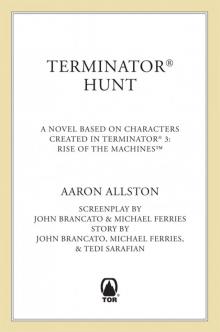 Terminator 3--Terminator Hunt
Terminator 3--Terminator Hunt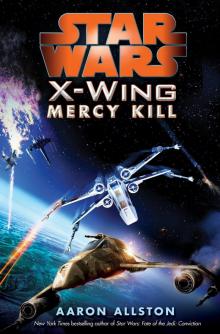 Mercy Kil
Mercy Kil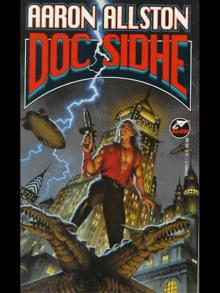 Doc Sidhe
Doc Sidhe Star Wars: Fate of the Jedi: Outcast
Star Wars: Fate of the Jedi: Outcast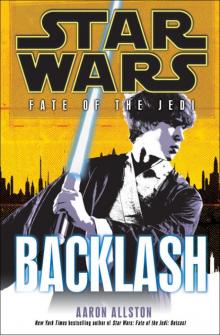 Fate of the Jedi: Backlash
Fate of the Jedi: Backlash Mercy Kill
Mercy Kill Rebel Stand
Rebel Stand Wraith Squadron
Wraith Squadron Star Wars: X-Wing VII: Solo Command
Star Wars: X-Wing VII: Solo Command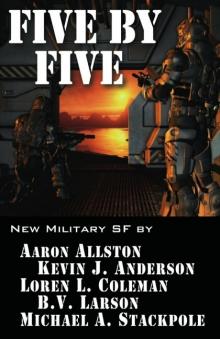 Five by Five
Five by Five Solo Command
Solo Command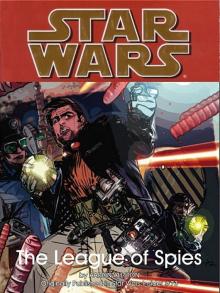 Star Wars: The Clone Wars Short Stories: The League of Spies
Star Wars: The Clone Wars Short Stories: The League of Spies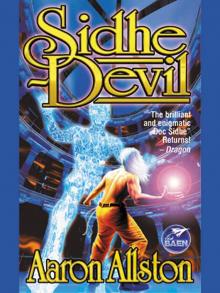 Sidhe-Devil
Sidhe-Devil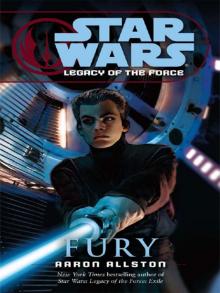 Star Wars: Legacy of the Force: Fury
Star Wars: Legacy of the Force: Fury Starfighters of Adumar
Starfighters of Adumar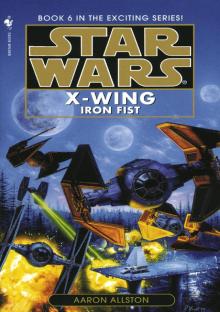 Star Wars: X-Wing VI: Iron Fist
Star Wars: X-Wing VI: Iron Fist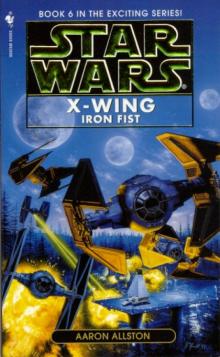 Star Wars - X-Wing - Iron Fist
Star Wars - X-Wing - Iron Fist Exile
Exile Star Wars: X-Wing V: Wraith Squadron
Star Wars: X-Wing V: Wraith Squadron Star Wars - X-Wing - Starfighters of Adumar
Star Wars - X-Wing - Starfighters of Adumar Rebel Stand: Enemy Lines II
Rebel Stand: Enemy Lines II Rebel Dream: Enemy Lines I
Rebel Dream: Enemy Lines I Outcast
Outcast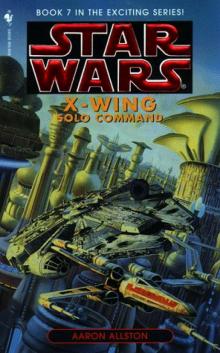 Star Wars - X-Wing 07 - Solo Command
Star Wars - X-Wing 07 - Solo Command